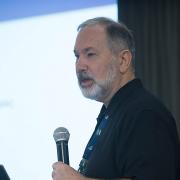Presentations

The talk will introduce FreeIPA project as the first fully functional open source centralized authentication and identity management solution. Comparable to Active Directory, but using open source standards like 389ds, openssl, kerberos and more.

Over the past two years Canonical has been changing the way it works together with members of the community to deliver products around business needs, deadlines and partnerships. Starting with the Skunkworks project announced by Mark Shuttleworth in 2012, we have been evolving how we bring people in from the community, how their work is treated, what they can expect from us and what we expect from them. The most recent iteration of this is the Core Apps project, where the community has developed a number of essential applications for our first phone launch.
It's relatively rare and difficult to keep a large scale open source project going year after year without the firm financial backing of a larger organization. Since its inception in 2002, the software currently called Kodi has gone through numerous changes, both at the software level and at the organizational level, and has encountered numerous difficulties along the way, from simple communications problems both internally and with the userbase to larger organizational snafus. In this talk, we'll review how the organization has managed to overcome these problems and continue on.

The Internet of Things has begun to form, and the Age of Robots is upon us. What are the tools and techniques that will help us craft the technologies that will make it real? In this talk, we will share our vision of "Full Stack Robotics" based on open source software such as Cylon.js (http://cylonjs.com) & Gobot (http://gobot.io), with live demonstrations of actual robotic devices.

One of the key strengths of PostgreSQL is its extensability, and at the core of that are functions. In PostgreSQL functions can be used as an end in-and-of themselves, or they can be used to allow the creation of other custom SQL objects such as operators and aggregates.
This presentation will enlighten the audience on the vast array of capabilities embodied in PostgreSQL functions, and illustrate many of the key features through simple and real world examples.

Linux-IO provides a SCSI target which can be used with the distribution of your choice. This presentation will briefly cover the history, use cases, and technical details of Linux-IO, while the focus will be on building an iSCSI SAN using general purpose Linux distributions such as Ubuntu or Fedora. With Linux-IO you can turn any PC that can run Linux into a SAN, and performance can even be good by using a cheap SSD. It is perfect for sysadmins learning about storage or virtualization on a budget. Attendees should be comfortable with the Linux command line and with general SAN concepts.

GlusterFS is a unified, poly-protocol, scale-out filesystem serving many petabytes of data using commodity x86 hardware. Gluster can service Unix, Linux, and Windows clients using NFS, CIFS, or the native Gluster protocol.
Red Hat's Thomas Cameron, Chief Architect for the central US, will demonstrate getting Gluster set up. He'll cover setting up the Gluster nodes and setting up distrubuted, replicated, and geo-replicated environments.



